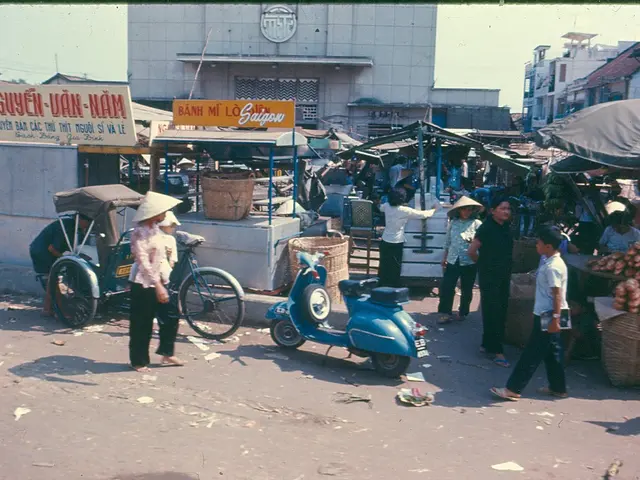Countries in the Sahel region grapple with uncertain futures after their exit from the Ecowas alliance
The Economic Community of West African States (ECOWAS) has witnessed a significant shift, with Mali, Niger, and Burkina Faso officially withdrawing from the regional bloc. Their membership ended on January 29, 2025, and the exit procedures will be concluded by July 29, 2025 [1][3].
Over the past two months, the region has seen a sharp rise in jihadist attacks, marking one of the deadliest periods in recent Sahel history [2]. The withdrawal follows prolonged political and security tensions, particularly involving the military-led governments of these Sahelian nations, which led to their suspension and sanctions by ECOWAS in prior years [4].
Despite the formal exit, ECOWAS has yet to impose immediate changes on trade, travel, or security relations, maintaining a grace period during which mutual benefits and free movement remain in effect [3][5]. Passports and identity cards issued under ECOWAS rules remain valid, and customs duties on goods and services traded between the countries continue temporarily; however, the continuation of these arrangements is now uncertain and subject to future amendments [3][5].
The split could undermine regional cooperation against common threats such as terrorism and organized crime in the Sahel. ECOWAS's ability to coordinate joint military and security efforts with the departing countries faces significant challenges, possibly prompting the three nations to seek alternative security alliances [1][3].
Internally, ECOWAS is engaged in processes to reform and adjust to this geopolitical shift. It stresses diplomatic efforts to maintain regional stability and acknowledge the withdrawal while striving to preserve cooperation frameworks and solidarity across West Africa [1][3][4]. The departure also underscores the challenge of integrating diverse political regimes and addressing governance issues within the bloc.
The withdrawal puts pressure on ECOWAS to undergo internal reform and address security challenges, particularly the spread of jihadist threats. Over the past decade, insurgency has displaced millions, destroyed economies, and pushed violence further south toward the coast [6].
As France scales back its military operations in its former colonies, Russia is becoming the main strategic partner for West African states [7]. The withdrawal of Mali, Burkina Faso, and Niger from ECOWAS may take years for political, financial, and legal disentangling [8].
Political analyst Baba Dakono emphasises the importance of avoiding undoing decades of regional progress, especially on free movement and trade [9]. The future of West African integration hangs in the balance as both ECOWAS and the withdrawing nations navigate this complex period of change.
[1] BBC News. (2023, January 29). Mali, Burkina Faso and Niger leave Ecowas. https://www.bbc.com/news/world-africa-57034158
[2] Al Jazeera. (2023, April 1). Deadly jihadist attacks mark one of the deadliest periods in recent Sahel history. https://www.aljazeera.com/news/2023/4/1/deadly-jihadist-attacks-mark-one-of-the-deadliest-periods-in-recent-sahel-history
[3] ECOWAS. (2023, January 29). Press release: Withdrawal of Mali, Burkina Faso, and Niger from ECOWAS. https://www.ecowas.int/en/press-release/withdrawal-mali-burkina-faso-and-niger-ecowas
[4] Reuters. (2022, December 15). ECOWAS lifts sanctions on Mali, Burkina Faso, and Niger. https://www.reuters.com/world/africa/ecowas-lifts-sanctions-mali-burkina-faso-niger-2022-12-15/
[5] Africanews. (2023, February 10). ECOWAS maintains grace period for Mali, Burkina Faso, and Niger. https://www.africanews.com/2023/02/10/ecowas-maintains-grace-period-for-mali-burkina-faso-and-niger/
[6] The Guardian. (2023, March 12). More than a decade of insurgency has displaced millions in the Sahel. https://www.theguardian.com/world/2023/mar/12/more-than-a-decade-of-insurgency-has-displaced-millions-in-the-sahel
[7] France 24. (2023, May 10). Russia becomes main strategic partner for West African states. https://www.france24.com/en/africa/20230510-russia-becomes-main-strategic-partner-for-west-african-states
[8] Africa Report. (2023, June 1). The withdrawal of Mali, Niger, and Burkina Faso from ECOWAS may take years. https://www.africareport.org/2023/06/01/the-withdrawal-of-mali-niger-and-burkina-faso-from-ecowas-may-take-years/
[9] Voice of America. (2023, April 20). Analyst: Withdrawal of Mali, Niger, and Burkina Faso from ECOWAS could undo decades of regional progress. https://www.voanews.com/africa/analyst-withdrawal-mali-niger-and-burkina-faso-ecowas-could-undo-decades-regional-progress
- The Economy of West Africa might experience a shift following the withdrawal of Mali, Niger, and Burkina Faso from ECOWAS.
- The period from January 29, 2025, to July 29, 2025, will be used to complete the exit procedures for these three countries.
- Jihadist attacks have surged in the Sahel region over the past two months, making it one of the deadliest periods in recent history.
- The reason for the withdrawal is due to prolonged political and security tensions, particularly involving the military-led governments of the Sahelian nations.
- ECOWAS has yet to make immediate changes on trade, travel, or security relations after the official exit of Mali, Niger, and Burkina Faso.
- The grace period allows mutual benefits and free movement to remain effective for a certain duration.
- The continuation of existing trade arrangements is now uncertain and subject to future amendments.
- The split could hinder regional cooperation against threats such as terrorism and organized crime in the Sahel.
- ECOWAS faces significant challenges in coordinating joint military and security efforts with the departing countries.
- The three nations may seek alternative security alliances as a result of their withdrawal from ECOWAS.
- ECOWAS is working on reforms and adjustments to address this geopolitical shift.
- Diplomatic efforts are being employed to maintain regional stability and preserve cooperation frameworks across West Africa.
- The departure underscores the challenge of integrating diverse political regimes and addressing governance issues within the bloc.
- France is scaling back its military operations in its former colonies, while Russia is becoming the main strategic partner for West African states.
- The withdrawal of Mali, Burkina Faso, and Niger from ECOWAS may take years for political, financial, and legal disentangling.
- Political analyst Baba Dakono stresses the importance of avoiding undoing decades of regional progress, especially on free movement and trade.
- The future of West African integration remains uncertain as both ECOWAS and the withdrawing nations navigate this complex period of change.
- Insurgency has led to the displacement of millions, destruction of economies, and the push of violence further south toward the coast.
- Over the past decade, insurgency has become a significant issue in the Sahel region, calling for immediate action.
- ECOWAS is under pressure to tackle security challenges, particularly the spread of jihadist threats.
- Sports, such as football, basketball, baseball, hockey, golf, tennis, and auto racing, have a global presence and attract international attention.
- The Champions League, NFL, WNBA, NCAABasketball, MLB, NHL, Racing, Premier League, American Football, NBA, Masters, Grand Prix, Horse Racing, and Serie A are some of the well-known sports tournaments.
- Weather forecasting plays a crucial role in various sectors, including sports analysis and general news.
- Crime and justice, along with career development, education and self-development, personal growth, mindfulness, job search, and policy and legislation are important topics that affect society.
- Migration, war and conflicts, general news, and learning are crucial aspects that influence the course of history and politics.
- Goal-setting, lifelong learning, and skills training are essential for personal and professional growth in our contemporary world.
- Learning about various sports, weather forecasting, and different aspects of life will help in personal and intellectual development.







